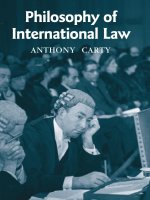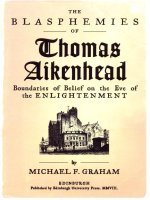edinburgh university press islamic philosophy a-z may 2007
Bạn đang xem bản rút gọn của tài liệu. Xem và tải ngay bản đầy đủ của tài liệu tại đây (1.16 MB, 257 trang )
Islamic Philosophy A–Z
Peter S. Groff
Islamic Philosophy A–Z comprises over a hundred concise entries, alphabetically
ordered and cross-referenced for easy access.All the essential aspects of Islamic
philosophy are covered here: key figures, schools, concepts, topics and issues.
Articles on the Peripatetics, Isma‘ilis, Illuminationists, Sufis,
kalam theologians and
later modern thinkers are supplemented by entries on classical Greek influences as
well as Jewish philosophers who lived and worked in the Islamic world.Topical
entries cover various issues and key positions in all the major areas of philosophy,
making clear why the central problems of Islamic philosophy have been, and remain,
matters of rational disputation.
This book will prove an indispensable resource to anyone who wishes to gain a
better understanding of this fascinating intellectual tradition.
Peter S. Groff is Associate Professor of Philosophy at Bucknell University,
Pennsylvania.
Co
v
er design: River Design, Edinburgh
Edinburgh University Press
22 George Squar
e
,
Edinburgh EH8 9LF
www.eup.ed.ac.uk
ISBN 978 0 7486 2089 0
Peter S. Groff
barcode
Edinburgh
Peter S. Groff
PHILOSOPHY A–Z SERIES
GENERAL EDITOR: OLIVER LEAMAN
These thorough, authoritative yet concise alphabetical guides introduce the
central concepts of the various branches of philosophy. Written by established
philosophers, they cover both traditional and contemporary terminology.
Features
• Dedicated coverage of particular topics within philosophy
• Coverage of key terms and major figures
• Cross-references to related terms.
Islamic Philosophy A–Z
Islamic Philosophy A–Z
ISLAMIC PHILOSOPHY A–Z
Volumes available in the Philosophy A–Z Series
Christian Philosophy A–Z, Daniel J. Hill and Randal D.
Rauser
Epistemology A–Z, Martijn Blaauw and Duncan Pritchard
Ethics A–Z, Jonathan A. Jacobs
Indian Philosophy A–Z, Christopher Bartley
Jewish Philosophy A–Z, Aaron W. Hughes
Philosophy of Language A–Z, Alessandra Tanesini
Philosophy of Mind A–Z, Marina Rakova
Philosophy of Religion A–Z, Patrick Quinn
Philosophy of Science A–Z, Stathis Psillos
Forthcoming volumes
Aesthetics A–Z, Fran Guter
Chinese Philosophy A–Z, Bo Mou
Political Philosophy A–Z, Jon Pike
Islamic Philosophy A–Z
Peter S. Groff
with
Oliver Leaman
Edinburgh University Press
© Peter S. Groff, 2007
Edinburgh University Press Ltd
22 George Square, Edinburgh
Typeset in 10.5/13 Sabon by
Servis Filmsetting Ltd, Manchester, and
printed and bound in Great Britain by
Antony Rowe Ltd, Chippenham, Wilts
A CIP record for this book is
available from the British Library
ISBN 978 0 7486 2216 0 (hardback)
ISBN 978 0 7486 2089 0 (paperback)
The right of Peter S. Groff
to be identified as author of this work
has been asserted in accordance with
the Copyright, Designs and Patents Act 1988.
Contents
Series Editor’s Preface vii
Introduction ix
Using This Book xiii
Acknowledgements xvii
Islamic Philosophy A–Z 1
Bibliography 217
For my Mother and Father
Series Editor’s Preface
Islamic philosophy is like all philosophy when tied in with a
religion in having indistinct parameters and requiring an
understanding of the religion as well as of philosophy. Peter
Groff explains a good deal about Islam in his book, and in
particular the range of theoretical issues that arose in the reli-
gion. Many of these are more theological than philosophical,
or so one might think, but really the distinction is rather arti-
ficial in Islamic philosophy. So many of the theological
debates had and indeed continue to have profound philo-
sophical significance. Over time philosophy was often under
attack in much of the Islamic world and went to ground, as
it were, in the guise of theology, and it is important for those
coming to the subject for the first time to bear in mind the
strong links that exist between Islamic philosophy and
Islam itself. This book is designed to be appropriate for
those coming for the first time both to the religion and to
the philosophy, and the entries are linked to other entries
and to further reading to help those readers broaden their
understanding of what they find here. The Arabic terms are
carefully explained and it is important to know the context
in which Islamic philosophy flourished. But it would be a
mistake to represent Islamic philosophy as exotic. Readers
familiar with philosophy in general will recognize many of
the issues debated here, and readers familiar with Islam
will also see how that religion quite naturally can be taken
to raise and then deal with philosophical issues. Readers
familiar with neither will be interested to discover what an
intriguing form of theoretical thought is represented by
Islamic philosophy.
Oliver Leaman
viii SERIES EDITOR’S PREFACE
Introduction
This book offers a series of inroads into the rich tradition of
Islamic philosophy. Those familiar with this tradition have
long recognized its profound influence on medieval Christian
and Jewish thought, as well as the pivotal role that Islamic
philosophers played in preserving and transmitting the legacy
of classical Greek thought to Europe. True as this picture is, it
is incomplete, because it overlooks the intrinsic value of
Islamic philosophy. This is a vital, flourishing tradition in its
own right, one that needs to be approached not just from the
perspective of its European beneficiaries, but on its own terms
as well.
The tradition of Islamic philosophy is remarkably diverse.
Far from being monolithic or homogeneous, it comprises a
wide range of positions and approaches, and brings with it a
lively history of disputation. In this book, we have tried to do
justice to the many different ways in which philosophy has
expressed itself within the Islamic context. The reader will
find entries on Greek-influenced Peripatetic thinkers and their
major ideas, various schools of theology, Isma‘ilis, Sufis,
Illuminationists, and later synthetic developments such as the
School of Isfahan, as well as some modern thinkers. We have
also included a handful of Jewish and Christian philosophers
whose work was profoundly influenced by, and in some cases
contributed significantly to, the Islamic intellectual tradition.
Finally, we have tried to convey some sense of the traditional-
ists’ critique of philosophy, which can be quite sophisticated
and powerful, and which is essential to a proper understand-
ing of the relative place of philosophy within the larger intel-
lectual life of Islam.
It is important to recognize the permeability of philosophy
and religion within the Islamic tradition, a fact that may at first
be perplexing to the contemporary student of philosophy. As
moderns, we often assume that these two approaches to the
good and the true are by their very nature distinct and antago-
nistic towards one another. Yet this is a relatively recent devel-
opment, and a rather culturally specific one at that. At the same
time it would be a mistake to see Islamic philosophy as identi-
cal with, or somehow reducible to, Islam as a religion. Islamic
philosophy has no uniquely ‘Islamic’ essence. It might simply
be described as philosophy that emerges within a context pre-
dominantly informed by the religious, social, political and cul-
tural dimensions of Islam. As such, its presuppositions and
conclusions may or may not be Muslim. Even when philosophy
begins by reflecting upon the revealed truths of Islam, it can
move in decidedly different directions. Sometimes it preserves
and clarifies and defends these insights, sometimes it appropri-
ates but radically reinterprets them, and sometimes it rejects
them altogether.
Thus, while recognizing the ways in which philosophy and
religion are intertwined in the Islamic tradition, we have tried
to keep the focus on the former rather than the latter, delving
into theology, Sufism and the traditional sciences only when
they had some crucial bearing on points of philosophical
interest. We have also opted for longer rather than shorter
entries on the whole, in order to (1) uncover the questions, dis-
putations and assumptions that gave rise to the major claims,
(2) capture something of the rationale or argumentative force
behind them, (3) show what is at stake philosophically, and
(4) convey some sense of their abiding universal interest.
Such an approach, combined with the necessarily limited
scope of a small introductory reference volume such as this,
x INTRODUCTION
has required that we leave out certain figures and concepts.
Given the intrinsic constraints of the work, our choices about
what to include were made with an eye to the student or new-
comer, rather than the specialist. If this book helps those
readers to appreciate the vital insights and resources of the
Islamic philosophical tradition – and perhaps even prompts
them to want to learn more about it – it will have succeeded
in its modest task.
INTRODUCTION xi
Should the reader wish to delve deeper into any particular
figure, school or topic, we have listed several additional
sources at the end of each entry as suggestions for further
reading: primarily book-length studies, occasionally specific
articles, and wherever possible, translations of primary
sources. We have included only works in English, but of course
the reader fluent in other languages can discover a world of
first-class scholarship by consulting their bibliographies. Apart
from the translations, book-length studies and articles we have
cited, there are numerous historical overviews, anthologies
and reference works, many of which may profitably be con-
sulted for virtually every entry in this book. For the sake of
economy, we have not listed these works over and over again
in the entries themselves, but encourage the reader to consult
them as well – in some cases first – should he or she wish to
pursue particular figures or ideas further. Although they are
included in the general bibliography, we will mention a few
such resources here.
First, for more detailed accounts of individual thinkers,
schools, topics and such, we strongly urge the reader to seek
out the anthology edited by S. H. Nasr and O. Leaman,
History of Islamic Philosophy (Routledge, 1996), as well as M.
M. Sharif’s earlier two-volume collection, A History of Muslim
Philosophy (LPP, 1961/99). Both of these collections comprise
top-notch essays by outstanding authorities in the field. A
recent addition to this genre – also excellent, albeit somewhat
less comprehensive – is The Cambridge Companion to Arabic
Philosophy, ed. P. Adamson and R. Taylor (Cambridge, 2005).
There are a number of very good encyclopedias worth con-
sulting as well. The most immediately useful will be the com-
prehensive two-volume Biographical Encyclopaedia of Islamic
Philosophy, recently compiled by O. Leaman (Thoemmes
Continuum, 2006). After that, I would recommend Brill’s new
edition of the Encyclopedia of Islam, ed. P. J. Bearman et al.
(Brill, 1960–2005), which also contains many articles on
Islamic philosophy and theology, all of the highest quality.
The first edition (1913–38, reprinted 1993) still contains
many classic, definitive articles. The Encyclopedia Iranica, ed.
E. Yarshater (Routledge Kegan and Paul, 1985ff.) can be a very
useful source too, as well as the Routledge Encyclopedia of
Philosophy, ed. E. Craig (Routledge, 1998), which includes
numerous entries on the Islamic philosophical tradition by
major scholars in the field. Finally, two good book-length his-
torical overviews can be found in H. Corbin’s History of
Islamic Philosophy (Kegan Paul International, 2001) and
M. Fakhry’s A History of Islamic Philosophy (Columbia
University Press, 1970/2004). O. Leaman’s An Introduction to
Classical Islamic Philosophy (Cambridge University Press,
2001) offers a somewhat more selective account, but is a fine
entry into key debates in the tradition.
We have included transliterated Arabic terms for many of the
key concepts, in order to give the reader some sense of the
actual technical vocabulary of Islamic philosophy. We have also
included Arabic (and in some cases, Persian) titles of books,
along with their English translations, since the latter can vary a
bit. There are a number of ways in which Arabic can be trans-
literated into English. We have employed the modified
Encyclopedia of Islam system, with a few qualifications. First,
because of the non-specialist nature of this book, we have opted
for minimal transliteration: all diacritics (macrons and dots)
have thus been omitted, while the left apostrophe (‘) represents
xiv USING THIS BOOK
‘ayn and the right apostrophe (’) represents hamza. Second, in
the interests of comprehension we have occasionally opted for
an alternative transliteration of a term or name, if it is more
commonly encountered and more easily recognizable. Third,
for the sake of clarity, we have as a rule retained Orientalist
word endings (e.g. Mu‘tazilite, Shi‘ite, Hanbalite), but again,
where the Arabic word ending has become more commonplace,
we have opted for that (e.g. Sunni, Isma‘ili, Sufi). Capitalization
has been kept to a minimum and is generally used only for
formal names of persons, schools of thought or places.
Traditional names, titles or standard descriptions of God such
as the Creator, the Originator, the Necessary Existent, the First
Cause and the One are capitalized; ‘divine’ entities such as the
forms, active intellect or universal soul are not. Use of the mas-
culine pronoun when referring to God is used simply out of def-
erence to traditional usage. With regard to dating, most figures
are listed first according to the Islamic calendar (AH, i.e. anno
Hegirae), then according to the Gregorian calendar (CE, i.e.
Common Era). For example, 1266–1323/1849–1905 means
1266–1323
AH
/1849–1905
CE
; references to whole centuries
follow the same general formula. The few exceptions to this are
the dates of (1) the Prophet Muhammad, whose birth date (570
CE
) precedes the beginning of the Islamic calendar (622
CE
), (2)
ancient Greek philosophers (listed as
BCE
, i.e. Before
the
Common Era) and (3) Jewish philosophers who worked in the
Islamicate milieu (only listed as
CE, because precise AH dates
were not always available). Within each entry, words in bold
signal a cross-reference, so that readers may chase down
figures or concepts that strike their interest.
USING THIS BOOK xv
I would like to thank Oliver Leaman for his patience, encour-
agement, practical wisdom and generous assistance in the
writing of this book. He helped out in the final stages by writing
entries on the following topics: aesthetics, afterlife, creation vs.
eternity of the world, epistemology, essence and existence,
ethics, God’s knowledge, God (unity of), Illuminationism, lan-
guage, law, logic, modern Islamic philosophy, mysticism, Nasr
(Seyyed Hossein), political philosophy, prophecy, science and
Sufism. The entry on Islamism is a collaborative effort. I am
responsible for all other entries, and of course, any errors or
lacunae that might be found there. I’d like to express my appre-
ciation to a few other folks, too: my colleagues in the Bucknell
Philosophy department, as well as philosophical interlocutors
from other departments and institutions, my former teachers,
and my students, all of whom have helped me keep thinking
and growing. Special thanks go out to Abdur-Rahman Syed and
Kaley Keene, who generously read through the manuscript and
made many thoughtful suggestions regarding translation and
transliteration, and to Laury Silvers, who offered so much
helpful advice along the way. Finally I would like to thank my
family and friends for their good-humored patience and
support, and especially my love Valerie, who is in my heart,
whether she’s in Pennsylvania, Switzerland or Belgium.
jurist, philosopher, religious scholar and liberal reformer,
‘Abduh played a pivotal role in the nineteenth-century
Renaissance (nahda)ofIslam. Along with his teacher al-
Afghani,heisresponsible for founding the Salafi reform
movement, which strove to recover Islam from its decadent
state by returning it to the spirit of its pious forefathers
(salaf). However, like al-Afghani and unlike the later
salafiyya, his sympathies were ultimately more rationalist
than traditionalist. ‘Abduh saw Islam as an essentially
reasonable and pragmatic religion, one that was not
necessarily at odds with the modern scientific world-
view. Indeed, despite his reservations about the West, he
embraced science and technology as crucial to the revivifi-
cation and autonomy of Islam. In his attempt to recover the
true spirit of Islam, ‘Abduh inveighed against the uncriti-
cal acceptance of dogma based purely on religious author-
ity (taqlid, lit. ‘imitation’ or obedience) and defended the
irreducible importance of independent judgement in reli-
gious and legal matters. He recuperated elements of
Mu‘tazilite rationalism as well (e.g. figurative interpreta-
tion of ambiguous Qur’anic passages, emphasis on God’s
transcendence,affirmation of human free will) and
attempted to purge Islam of Ash‘arite predestinarianism
A
and occasionalism, which he saw as hostile to the principle
of causality, and thus to modern science in general.
‘Abduh’s main philosophical work, the Theology of Unity
(Risalat al-tawhid), proceeds in this vein, but is primarily
known for its rationalist ethics. According to ‘Abduh,
revealed law does not make things good or evil, but rather
reveals to us what is naturally good or evil. Siding with the
Mu‘tazilites and the falasifa,heargued that human reason
is in principle capable of perceiving good and evil without
the aid of revelation. However, revelation is still necessary
because (1) not all people have the same intellectual capac-
ity to differentiate between good and evil (or to grasp the
existence and nature of God, the afterlife, etc.) and (2) for
most people, reason alone will not provide the specific
practical knowledge necessary to realize a happy life. At
the heart of ‘Abduh’s life and thought was the desire for
reform, whether religious, legal, moral or educational. For
this reason, he eventually parted ways with the more
radical al-Afghani and distanced himself from his erstwhile
teacher’s pan-Islamist project. He had a great impact on
subsequent religious, social and philosophical reformers
(e.g. Rashid Rida, Qasim Amin and Mustafa ‘Abd al-
Raziq), as well as influential twentieth-century nationalist
and revivalist movements that did not always share his
commitment to reason and gradual reform.
See al-Afghani; Ash‘arites; Islamism; modern Islamic
philosophy; Mu‘tazilites; rationalism; traditionalism
Further reading: ‘Abduh 1966/2004; Adams 1933;
Amin 1953; Hourani 1983
active intellect (al-‘aql al-fa‘‘al): The concept of the ‘active’
or ‘agent’ intellect plays a pivotal role in Islamic meta-
physics and psychology, particularly in the Peripatetic tra-
dition. Its origins can be traced back to the Aristotelian
notion of nous poietikos in De anima III.4–5. Expanding
4 ISLAMIC PHILOSOPHY A–Z
upon the doctrine that ‘that which thinks and that which
is thought are the same’, Aristotle draws a distinction
between a passive, potential intellect which becomes all
things and an active, productive (ostensibly eternal and
divine) intellect which makes all things. Aristotle posits
this ‘active intellect’ in order to account for the possibil-
ity of thought, which stands in need of an explanation
because it is a kind of process or movement, and as such,
is characterized by change. All change requires an efficient
cause to bring it about, so there must be some efficient
cause by which the transition of intellect from potential-
ity to actuality is effected. It is also described by Aristotle
and his commentators as a kind of illuminative principle
which sheds light upon universal forms, making them
intelligible to the human intellect. In Islamic philosophy,
this notion of the active intellect is taken up and typically
situated within a Neoplatonic cosmology (the tenth and
final intellect to arise through the process of emanation,
often associated with the moon and the angel Jibril), as a
kind of link between the human and the divine. It plays a
pivotal role in several respects. First, it functions as a prin-
ciple of both intelligibility and intellection by providing
form to the sublunary realm and actualizing potential
human intellect, enabling us to extract and disjoin intelli-
gible forms from objects of sense perception and ulti-
mately grasp them independently of it. Second, it makes
possible the perfection of human nature, the attainment
of highest happiness, and the immortality of the soul. As
the human intellect is transformed from its initial state of
pure potentiality to one of pure actuality, it becomes more
like the immaterial, eternal active intellect, and is ulti-
mately assimilated to it. Finally, the active intellect
explains the possibility of prophetic revelation – as the
reception of intelligibles by the imagination – within the
context of an Aristotelian/ Neoplatonic worldview.
ISLAMIC PHILOSOPHY A–Z 5
See Aristotle; causality; al-Farabi; Ibn Bajja; Ibn
Rushd; Ibn Sina; metaphysics; prophecy; psychology.
Further reading: Davidson 1992; al-Farabi 1973; Ibn
Rushd 2007; Ibn Sina 1952/1981; Netton 1989/95;
Rahman 1958
actuality and potentiality (fi‘l, quwwa): see metaphysics; psy-
chology
adab (etiquette, refinement, culture): Initially, the Arabic term
adab seems to be a virtual synonym for sunna (custom,
tradition), insofar as it has to do with a norm of habitual
conduct founded by ancestors or other exemplary
persons. This notion was gradually magnified and embell-
ished, particularly during the ‘Abbasid empire, and by the
heyday of Islamic humanism in the second half of the
fourth/tenth century under the Buyids, the term had taken
on a panoply of social, ethical and intellectual connota-
tions. Due to the increasing refinement of bedouin
customs by the introduction of Islam, as well as by expo-
sure to Persian, Greek and Indian civilization, adab had
come to signify a kind of ethical perfectionism that
encompassed good manners, etiquette, elegance, educa-
tion, urbanity, belles-lettres and culture in general. More
specifically, it referred to the sort of knowledge necessary
to produce refined, well-cultivated people. In this sense
adab can generally be seen as the secular complement to
‘ilm (science, knowledge), which has more to do with reli-
gious sciences such as tradition (hadith), jurisprudence
(fiqh), Qur’anic exegesis (tafsir), etc. It comprises knowl-
edge of poetry, rhetoric, oratory, grammar and history, as
well as familiarity with the literary and philosophical
achievements, the practical-ethical wisdom and the exem-
plary individuals of the pre-Islamic Arabs, Indians,
Persians and Greeks. It can be said to encompass the
6 ISLAMIC PHILOSOPHY A–Z









